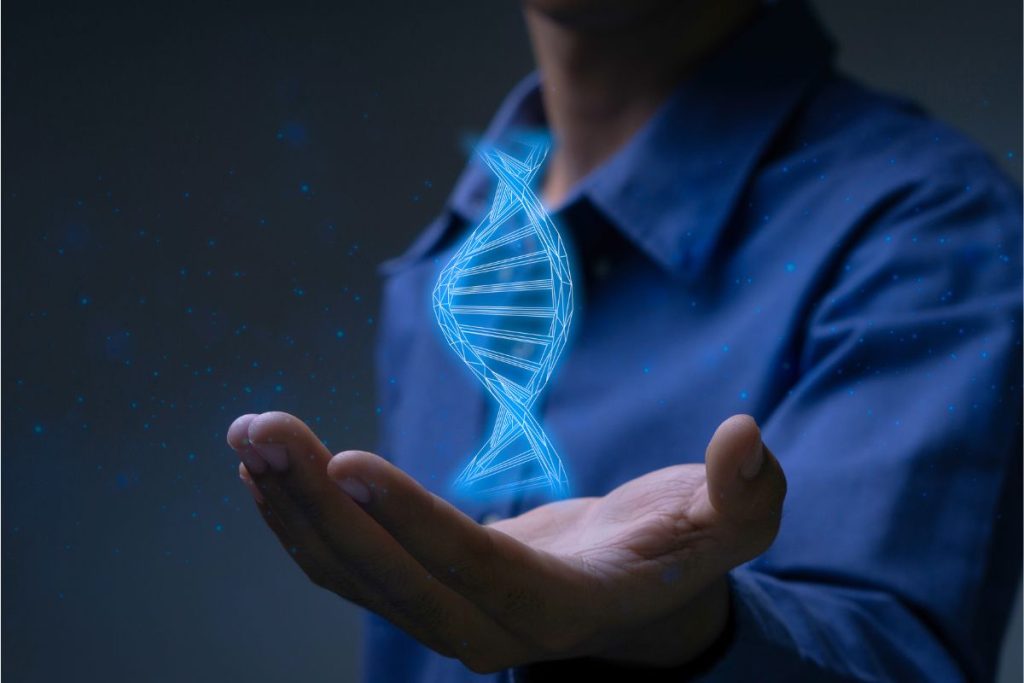Do you have a significant family history of cancer, such as breast, ovarian, pancreatic, or prostate cancer? Is there a link between prostate cancer and a genetic mutation? Let’s take a closer look.
What are genes and how do they work?
Your body is made up of trillions of cells, each with its own function. At the centre of each cell is a nucleus that contains your DNA – that is, your genetic code. Each person’s DNA is unique. DNA can be compared to a giant cookbook. This book describes you in great detail, from how you look to how your organs function. And in this DNA cookbook, your genes are the recipes.
As such, each cell contains all the recipes you need for your body to function. Cells follow the exact instructions provided by the genes to know when to grow, divide and die. So long as they follow the recipes provided by your genes, your body will stay healthy.
What is a genetic mutation?
Sometimes there are mistakes in the recipes; this is called a genetic mutation. These mutations occur when the DNA is altered or damaged. And when a recipe changes, the cells don’t understand the orders they need to follow as well as they should. In other words, the mutated genes no longer fulfill their role properly, and this can affect cell division.
All sorts of things can cause mutations in a gene. Some mutations are harmless, but others can increase cancer risk.
Inherited versus acquired mutations
There are two types of genetic mutations: inherited and acquired.
Most cancers are caused by acquired mutations, which are not passed from parent to child. Found only in tumours and nowhere else in the body, these mutations can be caused by the environment, diet and aging, or by unknown reasons.
Conversely, 5% to 10% of cancers are thought to be due to an inherited mutation. Inherited mutations are present from birth, and therefore usually passed down from the parents. In a way, it’s as if there was already a mistake in a recipe from the giant cookbook you inherited from your parents, who inherited it from their own parents.
If you have an inherited mutation, there’s a chance you could pass it down to your own children. Having an inherited mutation doesn’t mean you’ll get cancer, but it does increase your risk of developing it. In the case of prostate cancer, it’s mutations in the BRCA genes [1] in particular that affect cancer risk.
Genetics and risk factors − Signs of an inherited mutation
Certain signs may indicate that prostate cancer is due to an inherited mutation, such as having a family history of breast, ovarian, pancreatic or prostate cancer, being diagnosed at a young age and developing multiple tumours.
If you present such signs, your doctor may recommend testing to check for a genetic mutation. If the tests are positive, you may be eligible for a new targeted therapy to better treat your cancer. What’s more, the tests will provide more information about your risk of developing other cancers. You’ll also be able to pass this information on to family members who may be at risk of developing prostate, breast, ovarian or pancreatic cancer.
Take the time to visit each of our pages on this website, as well as our YouTube channel, in order to get familiar with the disease, our expert lectures and webinars, our section on available resources, the support that is offered to you, our events and ways to get involved in advancing the cause.
You have questions or concerns? Don’t hesitate. You can chat with us or contact us at 1-855-899-2873 to discuss with one of our nurses specialized in uro-oncology. They are there to listen, support and answer your questions, as well as those of your family or loved ones. It’s simple and free, like all of our other services.
Pages on our site that might interest
Want to know more? Just click on one of the links below.
Am I at risk
PROCURE blog articles that will enlighten you
Every week, we publish a blog article. Here are a few for you.
Why a health check?
Prostate cancer: Is it a disease of the elderly?
What women should know about prostate cancer



 ADDITIONAL RESOURCES
ADDITIONAL RESOURCES

